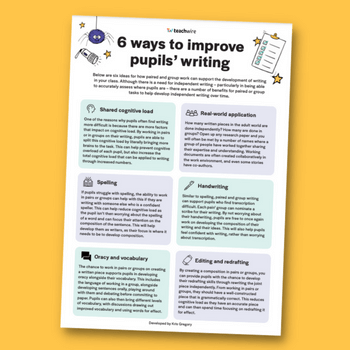There is a need for independent writing – particularly in being able to accurately assess where pupils are. However, there are a number of benefits for paired or group tasks to help develop independent writing over time.
Here are six ideas for how paired and group work can support the development of your pupils’ writing. Download the attached one-pager to keep the tips on hand. You could even display this as a poster in your classroom!
Cognitive load theory in the classroom
One of the reasons why pupils often find writing more difficult is because there are more factors that impact on cognitive load.
By working in pairs or in groups on their writing, pupils are able to split this cognitive load by literally bringing more brains to the task.
This can help prevent each pupil’s cognitive overload, but also increase the total cognitive load that they can apply to writing through increased numbers.
Real-life writing
How many written pieces in the adult world are done independently? How many are done in groups?
Open up any research paper and you will often be met by a number of names. In many instances, a group of people have worked together sharing their expertise and understanding.
Working documents are often created collaboratively in the work environment, and even some stories have co-authors.
Spelling
If pupils struggle with spelling, the ability to work in pairs or groups can help with this. Especially if they are writing with someone else who is a confident speller.
This can help reduce cognitive load as the pupil isn’t then worrying about the spelling of a word. Instead, they can focus their attention on the composition of the sentence.
This will help develop them as writers, as their focus is where it needs to be to develop composition.
Handwriting
Similar to spelling, paired and group writing can support pupils who find transcription difficult. Each pair/ group can nominate a scribe for their writing.
By not worrying about their handwriting, pupils are free to work on developing the composition of both writing and ideas.
This will also help pupils feel confident with writing, rather than worrying about transcription.
Oracy and vocabulary
The chance to work in pairs or groups supports pupils in developing oracy alongside their vocabulary.
This includes the language of working in a group, alongside developing sentences orally, playing around with them and debating before committing to paper.
Pupils can also then bring different levels of vocabulary, with discussions drawing out improved vocabulary and using words for effect.
Editing and improving writing KS2
By creating a composition in pairs or groups, you can provide pupils with the chance to develop their redrafting skills. This works particularly well when they can then rewrite the joint piece independently.
From working in pairs or groups, they should have a well constructed piece that is grammatically correct.
This reduces cognitive load, as they have an accurate piece and can then spend time focusing on redrafting it for effect.
Kris Gregory is a Year 3/4 teacher, with responsibility for English and the wider curriculum at Ashbrook Junior School in Derbyshire. Follow the school on Twitter @AshbrookJunior












